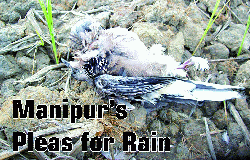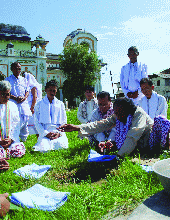Archives
Manipur's Pleas for Rain
Manipur's Pleas for Rain
 Climate change and a frightening pattern has emerged of late which is that there have been more heat waves which last for longer durations in this decade than in the previous two decades.
Climate change and a frightening pattern has emerged of late which is that there have been more heat waves which last for longer durations in this decade than in the previous two decades.
Surprisingly, the similar pattern of heat wave has reached traditionally and naturally air-conditioned states like Manipur in India’s Northeastern region this time. The unusual thunderstorm that raged on in the first week of May and had destroyed many habitations followed by an unexpected summer heat and a deficit of rainfall in Manipur are clear examples of this.
Unlike in the past, many wild birds,
the wild pigeons in particular were found killed in Manipur’s paddy fields particularly in Imphal East, West and Bishnupur districts after they consumed pesticide and insecticide treated paddy seeds since June’s end.
The main reason for this is the use of easily available insecticides by some farmers while sowing the seeds as they could not wait for natural rain. Cheap insecticides were used as they couldn’t afford the costly ones.“We are doing it with the hope of reaping the fruits of our effort but we hope that rain comes in the later stage of the season,” a farmer in Imphal East district said.
Shamo, a villager of Keibi in Imphal East district was one of the first farmers who collected as much as a bagful of dead wild birds from his paddy field. Residents of the neighbouring villages also had similar experiences. “I think the villagers here have collected more than a hundred dead birds at the rate of around 20 birds in a day,” Sanajaoba, a resident of Keibi said.
Meanwhile, a day after the Manipur government declared the state drought-affected due to insufficient rainfall, Manipur’s titular king Leishemba Sanajaoba along with his royal priests prayed to almighty god and sang rain-invoking songs such as Nong-o Churtharo (meaning come rain come) recently.
King Leishemba, lamenting the degradation of the environment due to unwanted human actions believes that the unnatural deaths in the State in the last few years may have direct links with the climate change.
Administering the traditional prayer at Chongabon at the Royal Palace in Imphal, S Kondumba the royal priest said a similar prayer was held in 1973 when his father priest Kala was in the royal palace, after which there was rain.
 There is a belief that rainfall will automatically start within 24 hours once such a prayer is conducted. Similarly, exactly after a week, a group of devotees performed the milking of cows at the historic Shri Shri Govindajee Temple complex as per the Manipuri belief to invoke rain.E Kunjeshwar, a Congress MLA in the Ibobi ministry and Vice-Chairperson of Shri Shri Govindajee Temple Board Manipur who led the rain invoking prayer cum milking session said, “We perform this as per our belief in view of the drought like situation in our state.”
There is a belief that rainfall will automatically start within 24 hours once such a prayer is conducted. Similarly, exactly after a week, a group of devotees performed the milking of cows at the historic Shri Shri Govindajee Temple complex as per the Manipuri belief to invoke rain.E Kunjeshwar, a Congress MLA in the Ibobi ministry and Vice-Chairperson of Shri Shri Govindajee Temple Board Manipur who led the rain invoking prayer cum milking session said, “We perform this as per our belief in view of the drought like situation in our state.”
Since time immemorial, the traditional prayer ritual to invoke rain was observed under different nomenclatures from time to time. When Wahengbam Nipamacha, a devotee of Shri Shri Govindajee was the Chief Minister of Manipur, 108 cows were milked at the temple in a move to invoke rain to combat the last drought in Manipur (1998-99).
“My son, we have so far performed such prayers twice in my 60 years of temple life,” says 86 year old Ksh Anganghal, Keibungba, a key member of the temple informed.
The owner of the cows Dr Lisham Herachandra of Thambalkhong village in Manipur’s Imphal East district said that the practice of milking cows to invoke rain is an old tradition. Recalling the tale of digging Ningthem Pukhuri, one of Manipur’s largest ponds during King Pamheiba’s regime wherein a mother of a new born baby milks, Dr Herachandra,a nature-curist by profession felt, “As per our belief, such tradition worked in ancient times.” The Ningthem Pukhuri is located at Wangkhei in Imphal East district.
“We had a close relationship with the god and goddess when nature was young,” this nature-curist felt. “Now things have been changed drastically due to many reasons.”
According to Meteorological Office Imphal, the state received 475 mm of rainfall this year, a downfall of 58 percent compared to 739.50 mm of rain by the end of June last year posing a problem for farmers. To meet the situation, the state has decided to open nurseries for paddy plants in 1,000 hectares at a cost of Rs 2.7 crore for a state which has around 1.8 hectares of cultivable land in the valley areas.
They also started to distribute 300 water pumps, including 200 of seven horsepower at an expenditure of Rs 84 lakh and a hundred of five horse power at a cost of Rs 32 lakh to the needy farmers besides taking up other precautionary measures at the cost of a total of Rs 4.41 crores.
On the other hand, having confidence of seasonal rain, Agriculture Director R K Nayansana informed that they are ready to procure Rs 50 lakhs worth of winter seeds like soya beans, gram and peas for early distribution to farmers to maintain the food security of the region.However minister N Loken, responding to a series of questions in the budget session of the Manipur Assembly sought cooperation from various quarters to combat the drought - like situation in the state. But his plea hardly convinced some senior opposition leaders including O Joy of Manipur People’s Party who blasted the ruling Ibobi ministry for their alleged failure to include a word on the burning global warning issue in the Governor’s address which was discussed recently. “I’m not criticizing the government, but I’m suggesting that something has to be done to deal with the climate change and global warming,” he observed.

